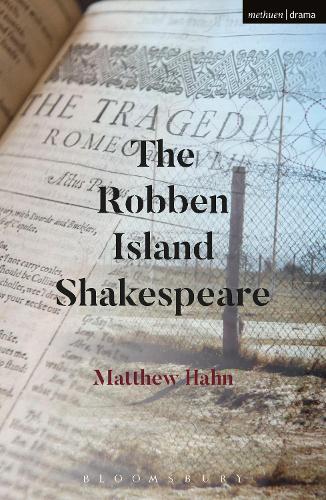
The Robben Island Shakespeare
(Paperback)
Publishing Details
The Robben Island Shakespeare
By (Author) Matthew Hahn
Bloomsbury Publishing PLC
Methuen Drama
12th January 2017
United Kingdom
Classifications
General
Non Fiction
822
Physical Properties
Paperback
80
Width 126mm, Height 198mm, Spine 8mm
100g
Description
During the Apartheid years in South Africa, a copy of The Complete Works of William Shakespeare was smuggled around the prison on Robben Island. The books significance resides in the fact that the book's owner, Sonny Venkatratham, passed it to a number of his fellow political prisoners in the single cells, including Nelson Mandela, asking them to mark their favourite passages with a signature and date. Informally known as "the Robben Island Bible", numerous prisoners selected the speeches that meant the most to them and their experience as political prisoners. In 2008 and 2010, playwright and scholar Matthew Hahn conducted interviews with eight former political prisoners in South Africa. Offering a vivid and startling account of the experience of these political prisoners during Apartheid, this extraordinary verbatim play weaves Shakespeare's words together with first-hand accounts from these men. They offer their reflections on their time as Liberation activists and, twenty years later, on the costs, consequences and whether or not it was all worth it. The play is published alongside a preface by Sonny Venkatrathnam and an introduction by South African actor, director , playwright and cultural activist John Kani.
Reviews
I think this is a really interesting project. The play avoids the obvious and gives a good insight into a range of personal stories, covering detainees from the ANC, the PAC and Black Consciousness (but I think it would be necessary in the introductory essay to give a clear account of the differences and relationships between them, set against the time-line of resistance to apartheid). So it offers a quite varied, significant and 'new' perspective/window on the inmates of Robben Island. And the play does give striking insights into the different groups of prisoners and how they reacted to their situation, as well as into the often ludicrously boneheaded and bureaucratic, and equally often callous and crass, behaviour of the warders and prison system. Professor Ralph Yarrow, University of East Anglia This play deals with an important and engaging topic: the lives and survival strategies of the political prisoners on Robben Island during the apartheid era (with a short reflection on the later betrayal of the ideals that governed those lives). It contains a great deal of fascinating material, based on written accounts of the experiences of prisoners and on interviews conducted by Matthew Hahn with former prisoners. The plays' "hook" is the prisoners' choosing of passages from Shakespeare's Complete Works, surreptitiously passed around the prison. Professor Derek Attridge, University of Warwick
Author Bio
Matthew Hahn lectures at St Mary's University, Twickenham on the Applied Theatre and Physical Theatre programmes. His main area of research is in Theatre for Development. He has worked as a theatre director and workshop leader in the United States, Africa and the United Kingdom. He also works with Theatre for a Change, a UK charity which trains teachers and youth workers in Malawi and Ghana.
